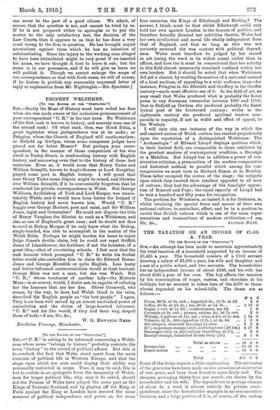[TO THE EDITOR OF THE "SPECTATOR. " ] SIR, —" C. It." in
asking to be informed concerning a Welsh- man whose name "belongs to history" probably restricts the term " history " to the record of political affairs. But this is to overlook the fact that Wales stood apart from the main currents of political life in Western Europe, and that the stage upon which her sons could display their ability was necessarily restricted in scope. True, it may be said, this is but to restate in an apologetic form the incapacity of Welsh- men for larger political life ; why, may it be asked, should not the Princes of Wales have played the same part as the Kings of Teutonic Scotland, and by playing off the King at Paris against the King at London have secured the same measure of political independence and power as, for some four centuries, the Kings of Edinburgh and Stirling P The answer, I think, must be that whilst Edinburgh could only hold her own against London in the domain of politics, and therefore forcedly directed her activities thereto, Wales had her own intellectual and moral life wholly independent from that of England, and that so long as this was not seriously menaced she was content with political depend- ence. Wales must therefore be judged by her record in art (using the word in its widest sense) rather than in affairs, and here too it must be remembered that her activity in this field almost necessarily remained confined within her own borders. But it should be noted that when Welshmen did get a chance, by availing themselves of a universal instead of a local medium, of appealing to a wide audience, they—for instance, Pelagius in the fifteenth and Geoffrey in the twelfth century—made most effective use of it. In the field of art, we may recall that Wales produced what is probably the finest prose in any European vernacular between 1000 and 1150; that in Dafydd ap Gwilym she produced probably the finest lyrical poet of the fourteenth century ; whilst in the eighteenth century she produced spiritual leaders com- parable in capacity, if not in width and effect of appeal, to the Wesleys.
I will only cite one instance of the way in which the self-centred nature of Welsh culture has reacted prejudicially upon the reputation of a distinguished Welshman. The " Archaeologia " of Edward Lhuyd displays qualities which, in their limited field, are comparable to those exhibited by the greatest masters of contemporary erudition, a Ducange or a Mabillon. But Lhuyd has in addition a power of con- structive criticism, a premonition of the modern comparative and historical method, to parallel which among his con- temporaries we must turn to Richard Simon or to Bentley. These latter occupied the centre of the stage ; the subjects upon which they exerted their intellect appealed to all men of culture; they had the advantage of the limelight opposi- tion of Bossuet and Pope; the equal capacity of Lhuyd had to wait a hundred and fifty years for recognition.
The problem for Welshmen, as indeed it is for Irishmen, is, whilst retaining the special force and savour of their own national culture, to assimilate, affect, and be in a position to enrich that British culture which is one of the main repre- sentations and transmitters of modern civilisation.—I am,














































 Previous page
Previous page